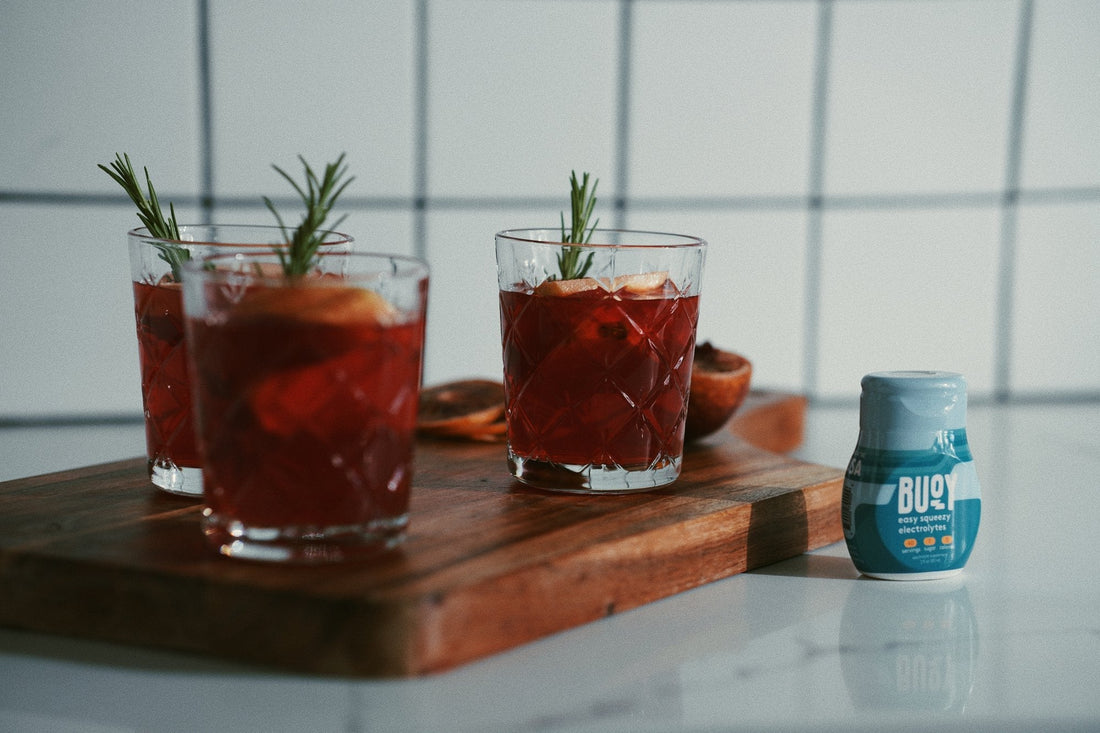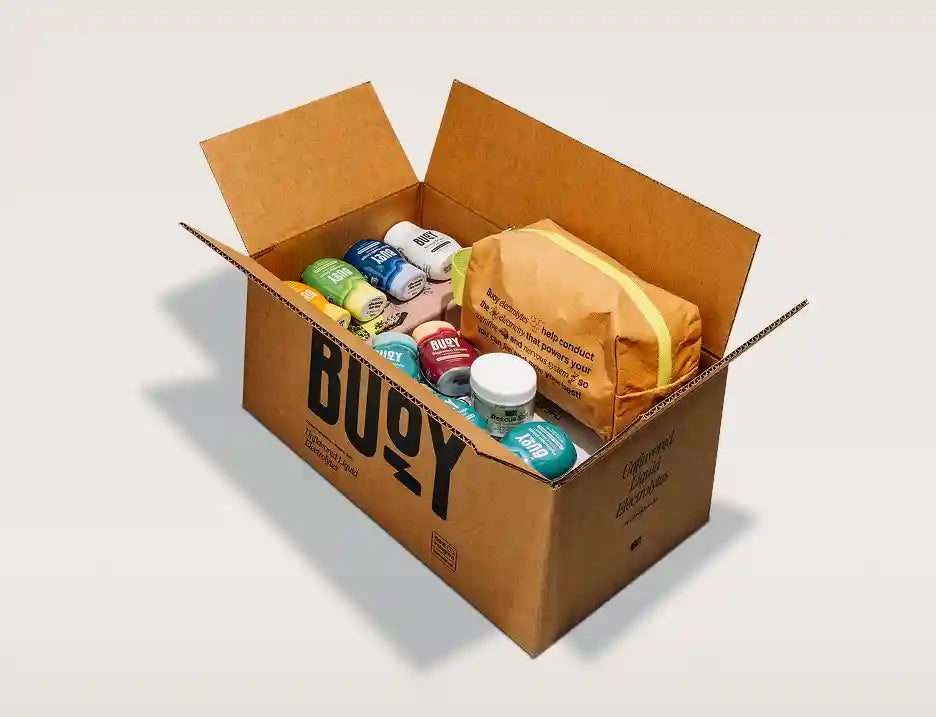
New Year, New Me: Hydration & Weight Loss
Share
How Hydration Helps You Lose Weight This New Year
As anyone who has struggled with weight loss knows, it takes dedication, planning, and lifestyle changes to drop pounds and keep them off. Diet and exercise are key factors in successful and healthy weight loss, but did you know that hydration impacts weight loss both directly and indirectly?
Essential Takeaways
- Want to lose more weight? Other than cutting out sugar, exercising and getting more of those leafy greens, staying consistently hydrated can have a lasting effect on the scale.
- Our favorite hydration supplement makes it easier and more convenient to stay hydrated than ever before!
Discover the benefits of hydration for weight loss to find success with your healthy lifestyle changes.
- Hydration: The Weight Loss Secret
- Warning Signs You Might Be Dehydrated & Sabotaging Weight Loss
- Smart Hydration Strategies That Support Fat Loss
- Safe Water Intake & Avoiding Overhydration for Weight Loss
- A Must Have In Any Hydration Plan
Hydration: The Weight Loss Secret
Much research connects hydration and weight loss, yet some people still don't drink enough water as part of their weight loss plan. Water affects weight loss through many direct and indirect influences, including:
Promoting Exercise
As you know, exercise is a key component of a weight loss plan. Whether you're involved in high-intensity training or just taking a daily walk, getting active burns calories and builds muscle, which raises your metabolic rate and promotes weight loss.
If you're feeling tired, exercise can feel nearly impossible. Dehydration, especially moderate to severe dehydration, can cause fatigue and low energy, making it even more difficult to get motivated to work out. It also affects your motivation to move around throughout the day, which is costing you calories that would be burned through normal activity.
Reducing Water Weight
Hydration is not just water intake, but electrolytes too. Electrolytes are minerals that carry an electric charge and serve vital functions in cellular activity, water equilibrium, pH levels, and more. When electrolyte levels are too low or too high, the fluid balance in the body shifts, which may lead to water retention.
Electrolyte imbalances occur when electrolytes are lost through normal processes, such as sweating and urinating, and aren't replaced. So, if you're working out in hot or cold weather or drinking a lot of water, it's important to replace those electrolytes to keep your fluid balance ideal and help your body use the water efficiently. Also, you can end up with imbalanced electrolyte levels and water retention from foods or supplements if you're not drinking enough, so be sure to include a healthy balance of both.
Certain electrolytes are even more important for weight loss. Sodium, which is usually obtained through salt on food, is a common electrolyte that has a major role in hydration. Sodium that's too high can cause water retention, especially if it's combined with low water intake. Magnesium is another important electrolyte that has an integrative role with other electrolytes, smooth and skeletal muscle function, and much more. Many people don't get enough magnesium in their diet, which can result in an imbalance with other electrolytes and diminished athletic performance.
Keeping Hunger at Bay
Water expands the stomach, which translates as fullness or satiation to the brain and suppresses hunger. If you struggle with overeating, drinking more water may help you feel fuller longer and prevent overindulgence. Water infused with fruit or another flavoring may also help with cravings for sweets or certain tastes, allowing you to satisfy yourself without "cheating" on your diet. Furthermore, dehydration can be confused with hunger or food cravings, so drinking more water keeps you from eating out of confusion between hunger and thirst.
Increasing Calorie Burn
Some research suggests that drinking water can burn calories, giving you yet another reason to get more water into your diet. In a study, a group of people who drank 500 mL of cold water and room-temperature water experienced an increase in energy expenditure of about 2% to 3% following intake. This is believed to be a result of the body needing to heat the water.
Decreasing Sugary Drinks
If you're accustomed to drinking soda, alcohol, sweet juices, and sweetened tea or coffee, you could be drinking a lot of your calories. If you replace those drinks with plain water, you could be saving hundreds of calories a day, which may amount to a pound or two of weight loss each week. It also helps you develop better habits because you're cutting back on sugared drinks and are less likely to add those calories back in the future.
Removing Waste
Water is necessary for nearly every biological process in the body, including excretory processes. The kidneys use water to separate waste and pollutants from essential nutrients and electrolytes. When you're dehydrated, the kidneys retain water. The digestive system also needs water to soften and loosen stool and keep waste moving, preventing constipation. While not technically "weight" in the sense of pounds of fat, an interruption in these processes can result in retained water, bloating, fatigue, discomfort, and a higher number on the scale and measuring tape.
Burning Fat
The process of burning fat is called lipolysis. The first part of this process is hydrolysis, or water molecules interacting with fats to create glycerol and fatty acids. Without adequate water intake, the body can't metabolize fat and carbohydrates, and it can't shed excess pounds. A 2016 study showed that increased water intake improves lipolysis in animal subjects.
Warning Signs You Might Be Dehydrated & Sabotaging Weight Loss
Dehydration can range from mild to severe and occurs when you don't drink enough to replace the water you lose through physiological processes like urinating, defecating, sweating, and, in the case of illness, diarrhea and vomiting.
Certain medical conditions and lifestyle choices raise the risk of dehydration. Working out in hot weather for extended periods of time, illness, pregnancy, and breastfeeding, kidney stones, and bladder infection can all lead to dehydration.
The symptoms of dehydration include:
- Little to no urine output
- Dark, concentrated urine
- Dry mouth
- Fatigue
- Extreme thirst
- Confusion
- Headache
- Lightheadedness
- No tear production
Smart Hydration Strategies That Support Fat Loss
The average recommendation is about 2 liters of water a day, or eight 8-ounce glasses, but that number is arbitrary. Many factors influence the amount of water each individual should drink — including exercise, climate, activity level, age, health conditions, and more.
While plain water is best for staying hydrated, drinks and fresh foods also supply much-needed fluids to our bodies. Herbal teas, fruit and vegetable juices, milk, and even energy drinks, soda, coffee, and other caffeinated beverages contribute to your fluid intake. However, excessive caffeine can cause excessive urination, which will impact hydration, so be mindful of caffeinated beverages. Water is also found in fruits and vegetables, soup broths, and some sauces, giving you a little extra intake with your meal.
Here are some tips to ensure you're hydrated:
- Keep a bottle of water with you and take sips throughout the day. You can get a reusable bottle to refill with a fountain or tap water.
- If plain water isn't palatable, add lemon or other fruit slices to your water to infuse some flavor.
- Be sure to drink plenty of water before, during, and following a workout. If the workout is particularly rigorous or takes place in hot and humid weather, be sure to replace the electrolytes you're losing in sweat with a hydration boost.
- If you struggle to remember to drink water, plan out a schedule of drinking first thing in the morning, before and after workouts, during meals, on work breaks, and before bed. You could also drink a little water at the start or end of each waking hour.
- When you dine out, order water and drink it during your meal.
- If you're feeling hungry, try drinking some water. Many times, mild dehydration is misinterpreted as hunger, so you may stave off the craving by drinking. If you're truly hungry, you'll still have hunger pangs after drinking water.
- Pay attention to your urine. Dark, concentrated urine is a sign of dehydration. Your urine should be pale yellow, not clear if you're hydrated.
Safe Water Intake & Avoiding Overhydration for Weight Loss
Though difficult, it is possible to drink too much water. This can manifest as a high volume of water (water toxicity) or drinking too much water and flushing out essential electrolytes, leading to hyponatremia. This is when your sodium concentration becomes too low from a rapid influx of plain water, and it usually occurs when you're dehydrated and drink an excess of water to make up for it without replacing electrolytes.
If you're concerned about hyponatremia, be sure to balance your intake of water with electrolytes to keep yourself hydrated.
Essential Hydration Tools & Supplements for Losing Weight
Whether you're trying to lose weight or looking to make healthy lifestyle changes, Buoy can help. The squeezable hydration boost includes all the essential electrolytes, B vitamins, and antioxidants you need, so you can replenish your minerals and maintain balance with your water intake. Best of all, the squeezy electrolyte bottle is easy to take with you and mixes perfectly into your favorite beverage, so you don't have to sacrifice taste for the minerals you need. Start squeezing your Buoy today!
Hydration, Metabolism & Appetite Control
Hydration doesn’t just help with water retention, it plays a direct role in how your body metabolizes food. Drinking water increases energy expenditure slightly; your body burns extra calories warming up the water to body temperature. Moreover, plenty of evidence shows that drinking a glass of water before meals may reduce overall calorie intake by promoting a sense of fullness. When your stomach senses volume, it sends signals to the brain that help curb appetite. This New Year, pairing hydration with meals can become a simple habit that helps prevent overeating, gently support metabolism, and contribute to sustainable weight loss.
Meal Timing and Hydration for Weight Loss
When you hydrate can matter just as much as how much. Starting your day with water (ideally with electrolytes) helps rehydrate your body after hours without fluids and stimulates your digestion. Drinking water 15‑30 minutes before meals can help with appetite control. Also, following workouts or physical activity, rehydration helps with better recovery, reducing muscle soreness and potentially supporting more frequent and better quality exercise, which supports weight loss. Try to spread your fluid intake evenly throughout the day: small consistent sips are better than drinking gallons in short bursts.
Hydration Myths That Hurt Your Fat Loss Goals
Many weight loss plans come with myths that interfere with hydration and actually stall progress. One myth is “drinking only when you’re thirsty is enough.” The truth: by the time you feel thirsty, mild dehydration has likely already set in. Another misconception is that all hydration comes from plain water alone - ignoring the role of electrolytes for fluid retention and balance. Also, some think that drinking a ton of water before bed speeds up weight loss - but overhydration at night can disturb sleep, which undermines metabolic and hormonal balance. Busting these myths helps you build a hydration plan that supports fat loss instead of unintentionally working against it.
FAQs
1. How much water should I drink to lose weight?
To lose weight, drinking the right amount of water is key. Studies like Increased Hydration Can Be Associated with Weight Loss show that upping water intake helps reduce calorie intake and supports fat metabolism. Aiming for about 2‑3 liters a day is a good benchmark, though your needs depend on body size, activity level, climate, and how much you sweat. Pair water intake with electrolytes for balanced fluid retention and metabolic support.
2. Can staying hydrated help suppress appetite?
Staying hydrated can help suppress appetite by helping the stomach feel fuller sooner. When your body has enough water, it reduces the chance that thirst gets mistaken for hunger. Drinking water 15‑30 minutes before meals is one simple strategy to reduce overeating. Combined with hydration tools like electrolyte drops, it becomes easier to manage cravings especially early in a diet or weight loss plan.
3. How does hydration affect metabolism and fat burning?
Hydration affects metabolism and fat burning because water is required for many biochemical processes, including lipolysis (the breakdown of fat). Studies suggest that drinking water, especially cold water, can temporarily increase the number of calories your body burns. Having enough fluids improves how efficiently your cells work, including energy production. When you're well-hydrated, your workouts are better, recovery is smoother, and metabolic output stays higher.
4. Is there a link between hydration and less water retention (less bloating)?
Yes, there’s a strong link between hydration and reduced water retention. When your body lacks enough fluids or electrolytes, it tends to hold onto water as a protective response, which causes bloating. Balanced electrolyte intake and consistent hydration help restore fluid equilibrium so the body doesn’t over‑retain. Drinking water regularly (not just occasionally) supports natural diuretic processes and reduces scale weight due to water retention.
5. What are the best hydration habits for new year weight loss resolutions?
The best hydration habits for new year weight loss resolutions include starting each day with water, drinking before meals, and keeping your water bottle accessible. These habits help maintain consistency. Also, infusing water with citrus or adding electrolyte drops can make it more appealing and functional. Tracking urine color (aiming for pale yellow) and adjusting your fluid intake based on weather, activity, or sweating are helpful practices for sustaining hydration that supports your weight loss goals.
6. Can dehydration slow down my weight loss progress?
Dehydration can slow down weight loss progress by reducing energy, causing fatigue, and lowering performance in exercise. When you’re dehydrated, metabolic processes run less efficiently. Digestion, fat utilization, and calorie burn can be negatively impacted. Also, thirst often disguises itself as hunger, leading to overeating. Staying properly hydrated ensures that your system operates closer to optimal, which supports consistent fat loss over time.

Keywords:
Hydration and weight loss, How water affects weight loss, Reducing water weight, Hydration for weight loss, Hydration boost
References:
- Vij, V. A. K., & Joshi, A. S. (2014, July). Effect of excessive water intake on body weight, body mass index, body fat, and appetite of overweight female participants. Journal of natural science, biology, and medicine. https://www.ncbi.nlm.nih.gov/pmc/articles/PMC4121911/M.
- JP;, G. M. G. E. K. D. A. G. M. Cardiovascular and Metabolic Responses to Tap Water Ingestion in Young Humans: Does the Water Temperature Matter? Acta physiologica (Oxford, England). https://pubmed.ncbi.nlm.nih.gov/24684853/.
- Pan, A., Malik, V. S., Hao, T., Willett, W. C., Mozaffarian, D., & Hu, F. B. (2013, October). Changes in water and beverage intake and long-term weight changes: results from three prospective cohort studies. International journal of obesity (2005). https://www.ncbi.nlm.nih.gov/pmc/articles/PMC3628978/.
- Thornton, S. N. (2016, June 10). Increased Hydration Can Be Associated with Weight Loss. Frontiers in nutrition. https://www.ncbi.nlm.nih.gov/pmc/articles/PMC4901052/.
- https://www.mayoclinic.org/diseases-conditions/dehydration/symptoms-causes/syc-20354086
- https://motivation.ie/top-tips/importance-hydration-healthy-weight-loss/#:~:text=Water%20is%20particularly%20important%20when,retention%20and%20decreases%20the%20appetite.
- https://www.medicalnewstoday.com/articles/322296#getting-enough-water
- https://hub.jhu.edu/at-work/2020/01/15/focus-on-wellness-drinking-more-water/
- https://familydoctor.org/hydration-why-its-so-important/
- https://health-bath.co.uk/blog/four-ways-dehydration-inhibits-fat-loss-and-four-ways-to-fix-it/
- https://www.healthline.com/nutrition/13-ways-to-lose-water-weight#section10




